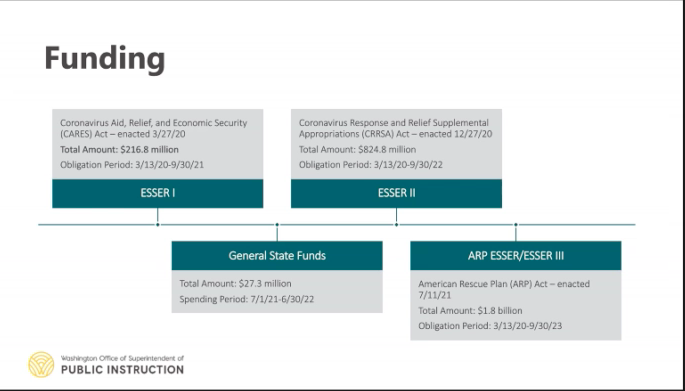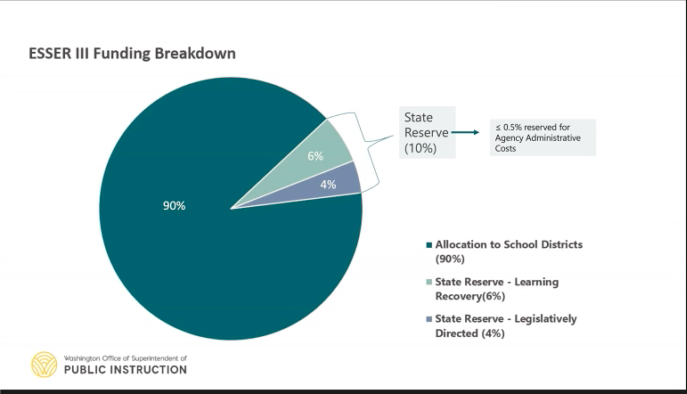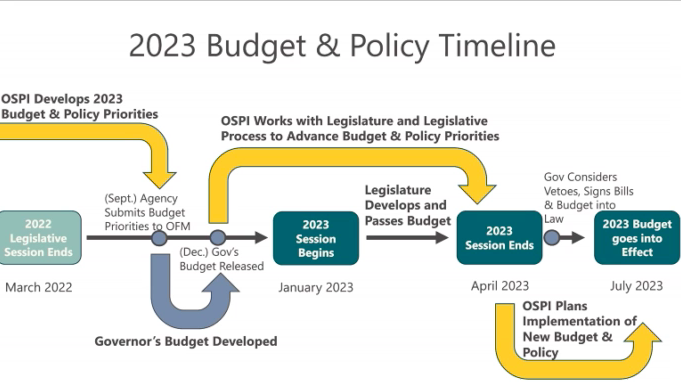OLYMPIA, Wash., July 29, 2022 – The Washington Office of Superintendent of Public Instruction (OSPI) held a webinar Tuesday, July 26, to update the public on pandemic recovery funding, initial thoughts on its 2023 legislative priorities, and to create opportunities for future partnerships and shared messaging.
The goal of the Washington Office of Superintendent of Public Instruction (OSPI) is to transform K-12 education into a system that is centered on closing opportunity gaps and is characterized by high expectations for all students and educators, which is achieved by developing equity-based policies and supports that empower educators, families, and communities.
Pandemic Recovery and Response
Beginning the webinar Sirena Wu, ESSER Project Manager, briefly highlighted some of the available funding the state has received over the course of the pandemic to go toward recovery in the education system.
“As many, if not all, of us have experienced the pandemic has really wreaked havoc in so many ways and schools, districts, students, educators are not immune to its negative effects,” Wu said. “When schools found themselves in this new normal with shutdowns and new health and safety regulations they really had to pivot and adapt to these new ways of doing business, like suddenly needing to meet technology needs, or investing in new capital improvements.”

In recognition of these challenges the U.S. Department of Education awarded pandemic grants to each of the 50 states through a series of waterfall funding. These were divided into three non-recurring rounds of emergency relief funds. The first was the Coronavirus Aid Relief and Economic Security Act (also called CARES Act) which was enacted in March 2020 in the total amount of $216.8 million. The second was the Coronavirus Response and Relief Supplemental Appropriations (CRRSA) Act, enacted December 20, 2020, in the total amount of $824.8 billion. The last was the American Rescue Plan Act (ARPA) enacted July 11, 2021 in the total amount of $1.8 billion.

Additionally, the state legislature also appropriated $27.3 million in the budget for the 2022 fiscal year toward learning, recovery, and acceleration. As far as the ARPA funds (the third round of funding) 90% of the dollars allocated to Washington State went to the school districts which allowed the districts to handle their unique recovery strategies as they saw fit.
OSPI 2023 Legislative Priorities
The bulk of the webinar focused on the OSPI’s 2023 legislative priorities, at least in its early stages, which can be boiled down to securing meaningful funding and support that center the needs of students, having access to a diverse, inclusive, and highly skilled workforce, maintaining equitable access to strong foundations, and offering rigorous, learner-centered options for all students.

Meaningful funding, Legislative Program Specialist Mikhail Cherniske explained, means having fully funded special education, student transportation, and universal school meals.
Jenny Plaja, Executive Director of Government Relations at OSPI, took over to explain the funding model OSPI developed to achieve this encompassing Staffing Enrichment Workgroup recommendations from its 2019 report. This report, according to Plaja, provided a student-focused, phase-in approach over six years to address the evolving needs of the students in Washington State.
“The legislature has made progress on many components recommended by the workgroup
including additional allocations for school counselors, nurses, social workers, psychologists and more,” Plaja said.
At the top of its 2023 legislative priorities OSPI plans on requesting legislature to fill the remaining recommendations outlined in the report’s first phase which include family engagement coordinators, student and staff safety, principles, continuous improvement coaches, and professional development days.
OSPI will request legislature help address staffing shortages by expanding a teacher residency program which will provide a full year, paid, residency program, and continue to support its Beginner Educator Support (BES) program which helps teachers through their first, novice, year.
“Through this, students will have equitable access to diverse, and highly skilled teachers grown in the same communities in which they will serve and who are ready on day one to support student’s success,” Anna Hernandez-French, Policy Analyst for OSPI, said.
Another strategic goal of the agency is to have strong, equitable, foundations which they aim to accomplish through strengthening dual language programs for multilingual students and families.
OSPI also plans on increasing funding to support the Educational Opportunity Gap Oversight and Accountability Committee and increasing the research capacity of the Center for the Improvement of Student Learning.
Lastly, pending an implementation plan and cost analysis, a placeholder for funding HB-1833, establishing an electronic option for the submission of household income information required for participation in school meals and programs, is set by OSPI among its priorities to remind the government and legislature that the cost assumptions are coming in the next couple of months. A similar placeholder is set involving funding for the OSPI Apportionment System redesign which is pending the results of a feasible study.
Capital Budget Requests
Tyle Muench, Outreach Coordinator, continued with OSPI’s Capital Budget Requests with the School Construction Assistance Program (SCAP), the primary program in the state. The School Construction Assistance Program provides funding assistance to school districts that are undertaking a major new construction or modernization project. In order to participate in this program school districts are responsible for securing local for construction process via levies or bonds which are sometimes difficult to accomplish, Muench explained, referencing the low bond passage rates across the state last year.
OPSI began thinking how to improve capitol facilities in small, rural, communities that fail bonds and levies in anticipation of lower SCAP requests this year but it is currently still in development as OSPI works with state legislature.
As far as policies, OSPI is proposing investing 100% of state trust land revenue in communities where trust land revenue is generated and, in lieu of constitutional amendments, is proposing investing trust and revenue into the Small District Modernization Grant Program, which is a program that was designed to help rural, small schools who fail to pass bonds and levies.
The Small District Modernization Program is a competitive grant program that fully funds state capital facility modernizations and building system repairs. It’s equitable, Muench said, because it does not require a bond or levy to participate in.
“Our message to legislature is going to be, you saved a bit of money on SCAP, let’s reinvest that money to other parts of education to improve capital facilities,” Muench said.
OSPI will be requesting the legislature to fully finance this program with common school trust revenue and is requesting $100 million to continue funding school seismic retrofits, tsunami tower installations, and school building relocations as part of its School Seismic Safety Program.
Other requests include $47 million for major works, and $9.1 million for minor works for Skills Centers statewide, $10 million for physical health and nutrition grants, $3 million for school drinking remediation, $1.5 million to remove toxic T-12 lighting ballasts from schools, $7.3 million for ADA equal access grants, $12 million for 114 urgent repair grants, and $5 million for the capitol emergency repair pool.
Author: Kienan Briscoe












